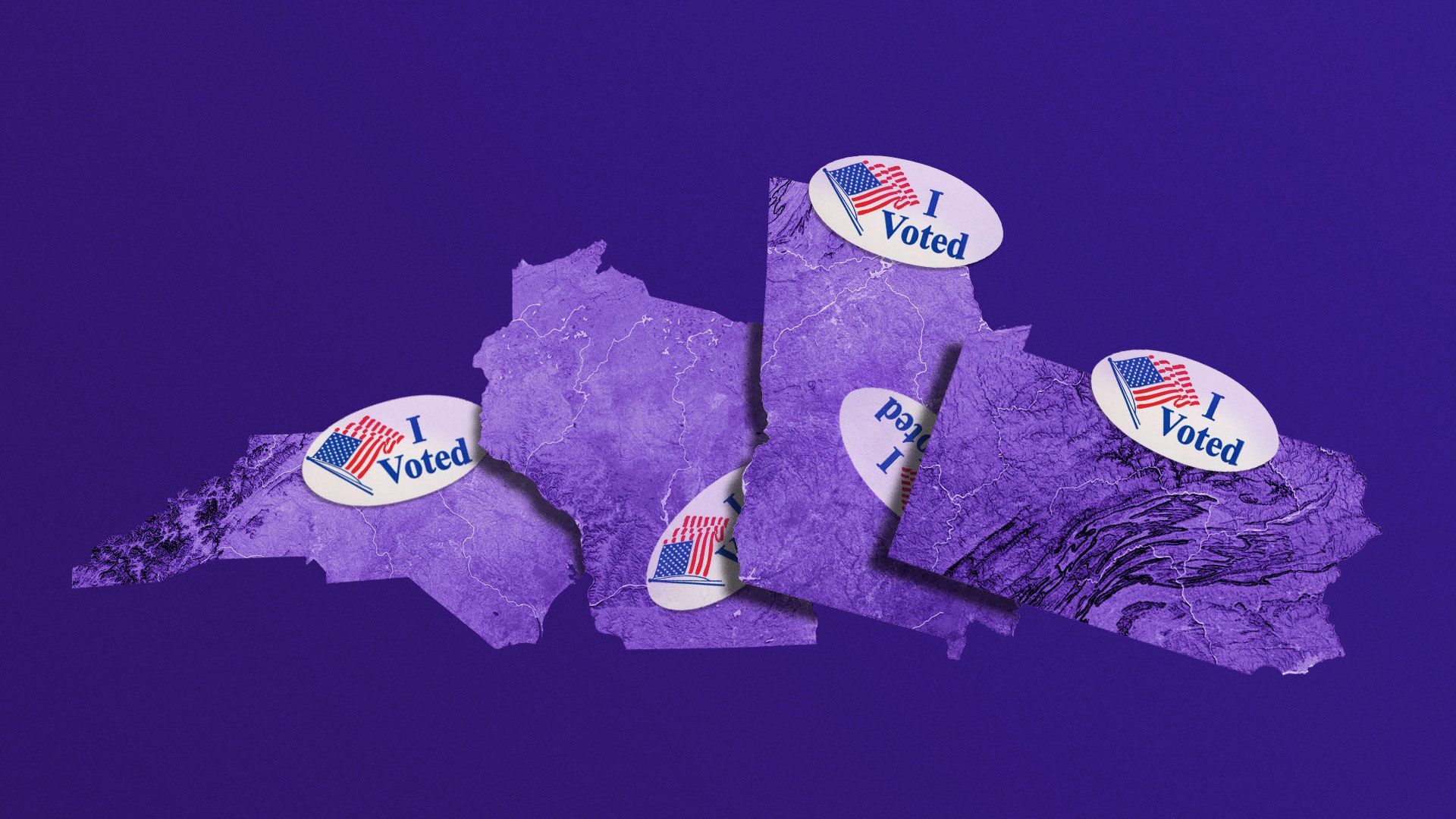The states at the center of the 2020 voting crisis
Add Axios as your preferred source to
see more of our stories on Google.

Illustration: Eniola Odetunde/Axios
Pennsylvania, Wisconsin, North Carolina and Georgia are the battlefronts for voting rights advocates and election lawyers in a year one national expert says could make Bush v. Gore look like "a walk in the park."
The big picture: What these states share in common are three overlapping factors that could create a perfect storm for legal challenges: competitive elections, surging coronavirus numbers and little experience historically with voting by mail.
- If elections are close in these states and some others, they could set off waves of protests and lawsuits over turnout, ballot access and alleged fraud — and that could undercut the perceived legitimacy of the results.
The big picture: Wisconsin and Pennsylvania backed Trump by less than one percentage point in 2016. Trump won Georgia and North Carolina with bigger margins — but fast forward to now and both currently are called "toss ups" by The Cook Political Report.
- Coronavirus cases rose last week in the same four states by between 14 and 37%. Come November, the bigger the threat of coronavirus, the more likely that many voters will avoid going to the polls in person.
Some states already have seen astronomical spikes this year in the use of vote-by-mail — but those four states don't have much experience with it.
- In 2018, just 3% of ballots were cast through the mail (including absentee) in North Carolina, 4% in Pennsylvania and 6% in Wisconsin and Georgia, according to data from the Brennan Center.
- U.S. Election Assistance Commissioner Donald Palmer tells Axios he believes that some states that have traditionally experienced 5%-10% levels of absentee voting could see it swell to 60%-70% because of the pandemic.
- Palmer also is watching swing states Michigan and Virginia, which along with Pennsylvania recently moved to no-excuse absentee voting and now will have to make that transition with surging interest in vote-by-mail options.
- Michigan, Florida and Arizona will also be key battleground states for 2020, but have more experience with absentee voting. Still, Detroit has a history of poor election administration.
What they're saying: "I think that Bush v. Gore is gonna be considered a walk in the park" compared to this election, MIT political scientist Charles Stewart III tells Axios. "I think there's going to be litigation everywhere."
- "This election certainly could hinge on one or two states," says Matt Strabone, general counsel with the voting rights group RepresentUs. He says any significant voting problems in key states could hurt the legitimacy of the election. Faith in elections already is low.
- Jason Snead, executive director of the right-leaning Honest Elections Project tells Axios that elections officials' decisions "could seriously change the outcome of the election." Last-minute changes, delays or mishaps could trigger litigation over results.
What to watch: Stewart expects to see a high degree of creativity when it comes to potential court challenges: "From just, kind of, run-of-the-mill recount types of challenges, to more, I'd say, kind of out-there claims of rampant voter fraud in the count, and attempts to put a stop to counting ballots."
Between the lines: Texas is another state to watch. It's long been at the center of voting rights battles. But this year the stakes could be higher, especially if there's any staying power behind recent polls that put Joe Biden within a couple points of Trump in this long-red state with 38 electoral votes.
- "The statewide leaders think that the way that they are going to hang on to power in the midst of changing times and changing demographics — like, their job security plan — is to suppress voters," says Myrna Pérez, director of the Brennan Center's Voting Rights and Elections Program.
- Texas had only had 6% of votes come through the mail in 2018.
Yes, but: Texas hasn't attracted as much sustained attention as these others states, in part because most elections experts don't yet see Texas as a swing state by most elections. On top of that, the state still does not have no-excuse absentee voting, despite lawsuits challenging those rules in light of coronavirus.
- Even if absentee voting does somewhat increase, only Texans with specific excuses can vote absentee — and that's a limitation that the Supreme Court already has decided to allow even during coronavirus.
